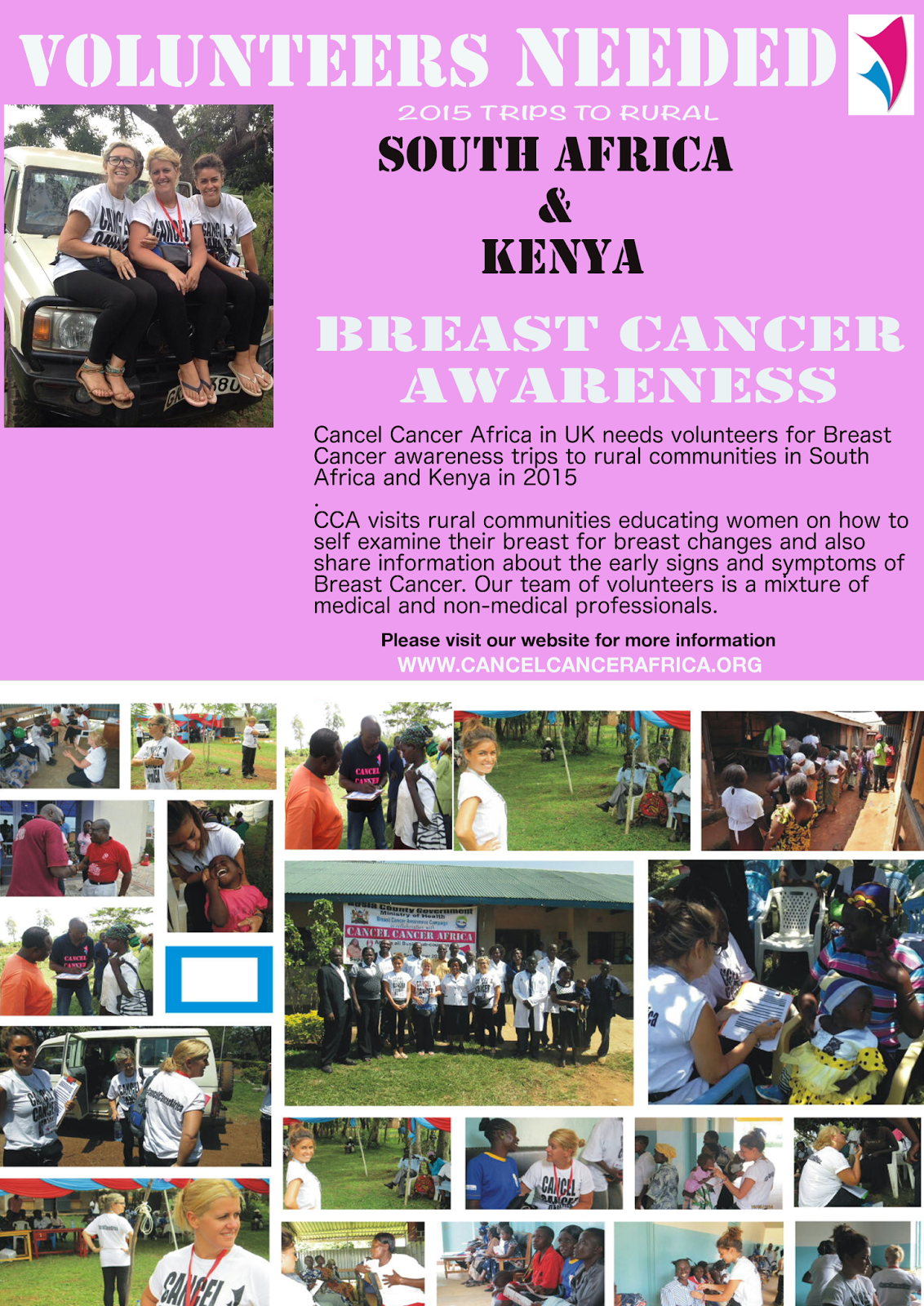 What are the chances of beating Metastatic Cancer in Africa?
What are the chances of beating Metastatic Cancer in Africa?
"After
reading this I lamented, for we have a long way to go in Africa. Even
ethnic minorities in developed countries, still don’t take Breast
cancer seriously."
Metastatic Cancer?Metastatic
cancer is a cancer that has spread from the part of the body where it
started (the primary site) to other parts of the body. When cancer cells
break away from a tumour, they can travel to other areas of the body
through the bloodstream or the lymph system (which contains a collection
of vessels that carry fluid and immune system cells).
If the cells travel through the lymph system, they may end up in
nearby lymph nodes (small, bean-sized collections of immune cells) or
they may spread to other organs. More often, cancer cells that break off
from the main tumour travel through the bloodstream. Once in the blood,
they can go to any part of the body. Many of these cells die, but some
may settle in a new area, begin to grow, and form new tumours. This
spread of cancer to a new part of the body is called
metastasis.
Cancer cells have to go through several steps to spread to new parts of the body:
- They
have to be able to break away from the original tumour and enter
the bloodstream or lymph system, which can carry them to another
part of the body.
- They need to attach to the wall of a blood or lymph vessel and move through it into a new organ.
- They need to be able to grow and thrive in their new location.
- They need to be able to avoid attacks from the body’s immune system.
Going
through all these steps means the cells that start new tumours may no
longer be exactly the same as the ones in the tumour they started in.
This may make them harder to treat. Even when cancer has spread to a new
area, it’s still named after the part of the body where it started.
Treatment is also based on where the cancer started. For example, if
prostate cancer spreads to the bones, it’s still prostate cancer (not
bone cancer), and the doctor will recommend treatments that have been
shown to help against metastatic prostate cancer. Likewise, breast
cancer that has spread to the lungs is still breast cancer, not lung
cancer, and is treated as metastatic breast cancer.
Sometimes the metastatic tumours have already begun to grow when the
cancer is first found and diagnosed. And in some cases, a metastasis
may be found before the original (primary) tumour is found. If a cancer
has already spread to many places when it’s found, it may be very hard
to figure out where it started. If this happens the cancer is called
cancer of unknown primary.
The Spread.
Where a cancer starts often plays a role in where it will spread. Most
cancer cells that break free from the original tumour are carried in
the blood or lymph until they get trapped in the next “downstream” organ
or set of lymph nodes. Once the cells are there, they can start new
tumours. This explains why breast cancer often spreads to underarm lymph
nodes, but rarely to lymph nodes in the groin. Likewise, there are many
cancers that commonly spread to the lungs. This is because the heart
pumps blood from the rest of the body through the lungs’ blood vessels
before sending it elsewhere. The liver is a common site of spread for
cancer cells that start in the colon because blood from the intestines
flows into the liver.
Cancer cells often break away from the main (primary) tumour and
travel through the blood and/or lymph system, but they don’t always
settle in and start new tumours. Most of the time, the cells that broke
away die. When cancer does spread to other organs and start to form new
tumours, it’s because of certain genetic changes in the cells that
scientists are now starting to understand. Someday, doctors may be able
to tell if a person’s cancer is the type that will spread to other
organs by looking for these genetic changes. Research is also focusing
on treatments that block or target these genetic changes so the cancer
cells can’t spread and grow.
Sometimes the patterns of spread cannot be explained by where things
are in the body. Some cancer cells are able to find and invade certain
sites far away from where they started. For example, advanced prostate
cancer often moves into the bones before spreading to other organs. This
“homing” pattern may be caused by substances on the cancer cell
surfaces that stick to cells in certain organs.
After reading this I lamented, for we have a long way to go in Africa.
Even ethnic minorities in developed countries, still don’t take Breast
cancer seriously. The fight to raise awareness must go on. Please
support our work or come with us to rural Africa. Volunteers are welcome
from every part of the world.
To volunteer or give to us please
CLICK or email info@cancelcancerafrica.org














































